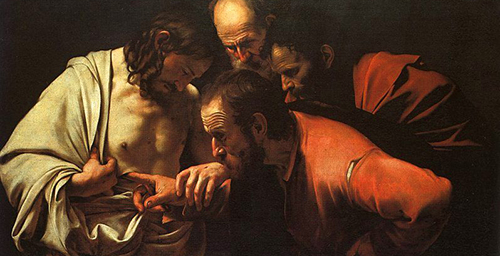
We live in a world of cynics and skeptics. If you’re like me, the moment you see a Magician, you dismiss the magic entirely and immediately try to figure out the trick. Or upon learning about a sale at one of our favorite stores, we often first look for the catch and wonder what’s hidden in the fine print. For many of us, new information is greeted with the response, “prove it,” and even good news is often received cautiously – as we wait for the other shoe to drop. In short, we live in a world of doubting Thomases; I should know, he’s my patron saint. But seriously, we can all relate to the apostle Thomas in one way or another. More than likely, we, too, would have had some hesitation in accepting the account of a man risen from the dead. When it comes to Jesus, there is simply a great deal of phenomenon for which we wish we had additional proof or explanation.
Many of our Church’s teachings, while always grounded in Sacred Scripture and tradition, can be difficult to understand, difficult to accept, and easy to doubt. Incarnation: Jesus is 100% man AND 100% God. That’s 200%; how’d He do that? How does a virgin conceive a child? How does the priest change the elements of bread and wine into the body and blood of Christ through the words of consecration? Why does it seem as if God is missing during some of the most turbulent times in our lives? The result of hard questions like these is frequently doubt.
Living in our world today – surrounded by violence, immorality, suffering and poverty – we can find it very difficult to think that through His passion, Jesus defeated sin and evil. It can be equally difficult for us to recognize or even imagine that the Risen Lord remains with us. Many of us, despite our prayers and church-going ways, still – at least from time to time – ask, or even demand, that God give us some sign; we seek tangible proof, and like Thomas, long to touch His wounds.
Unfortunately, absolute clinical, scientific proof of the presence of Jesus among us is not forthcoming. I say unfortunately because there will always be non-believers. But for believers, in the absence of proof, we rely on faith. A definition of faith that appeals to me goes like this: Faith is accepting that something is true based on the testimony of a trusted source. Our faith in Jesus is not blind faith mind you, but faith grounded in the trusted testimony of Sacred Scripture and the teachings of the Church. It is this same faith that allows us to accept the welcomed knowledge that Jesus loves us.